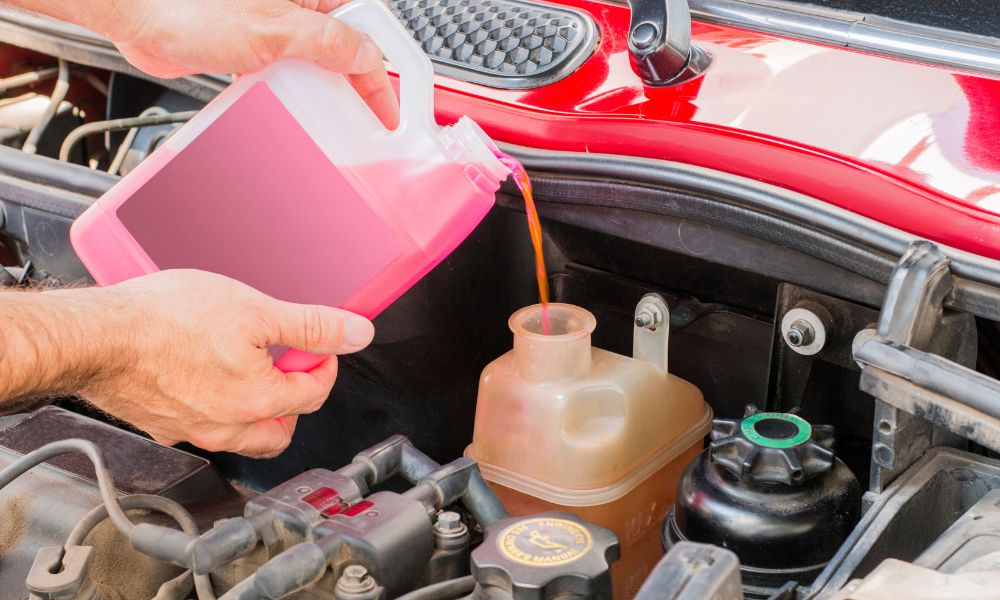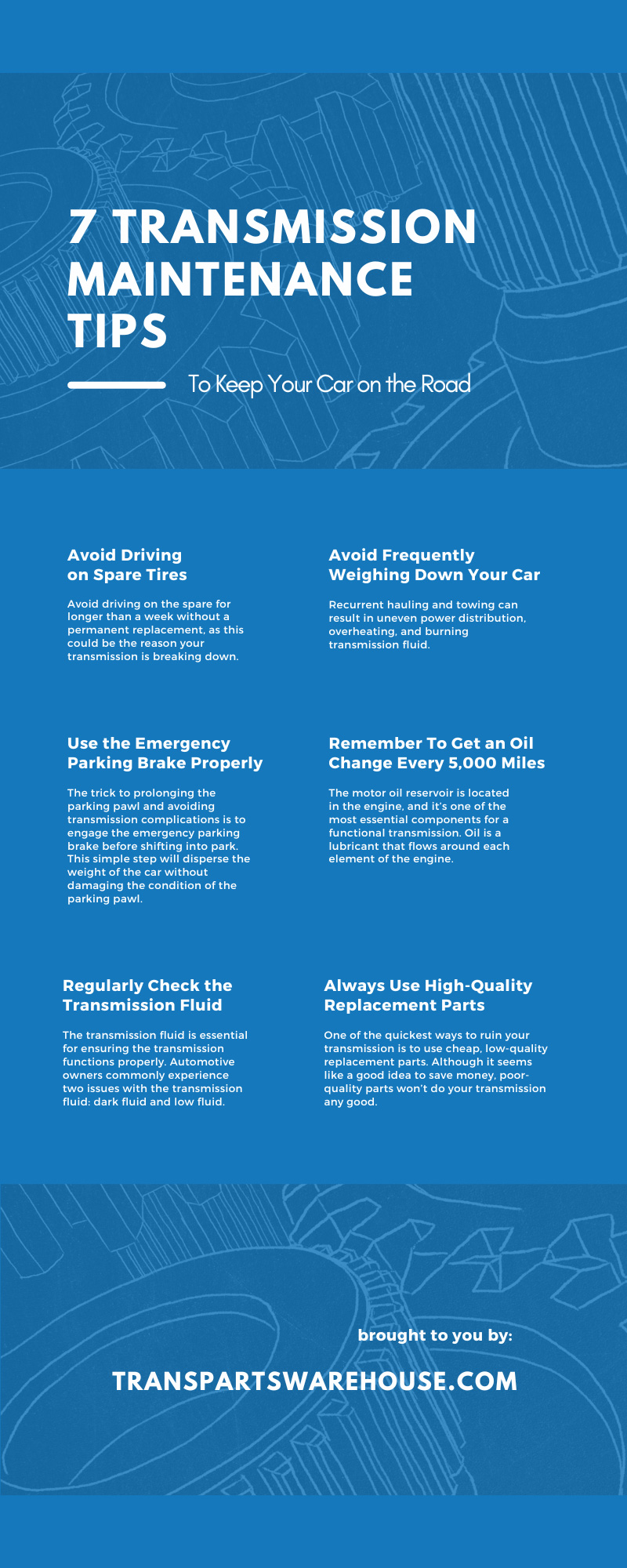
The transmission controls a vehicle’s ability to shift gears and change speeds. Without it, every car would function at the same speed and only move forward. It’s safe to say that caring for your car’s transmission is the key to a functional vehicle. If you want to learn how to keep your car on the road for as long as possible, you’ll need to follow these seven transmission maintenance tips!
Avoid Driving on Spare Tires
After a tire blowout, you should replace the tire with a spare. Avoid driving on the spare for longer than a week without a permanent replacement, as this could be the reason your transmission is breaking down.
The transmission evenly distributes power to the wheel axles. Because the spare tire does not match the rest of the tires, the transmission sends uneven power to each axle. Then, the tires will wear irregularly, the vehicle will be more tricky to handle, and the transmission will sustain damage.
Use the Emergency Parking Brake Properly
Did you know you can incorrectly park your car? The parking pawl keeps the automatic transmission in park. This small metal pin locks into the transmission output shaft. However, putting the car in park and engaging the emergency parking brake puts immeasurable strain on the parking pawl. Because the weight isn’t evenly distributed, the parking pawl will wear down.
How does this impact your car’s transmission? If you use the emergency parking brake improperly, the parking pawl might not disengage. Then, you won’t be able to shift into a different gear.
The trick to prolonging the parking pawl and avoiding transmission complications is to engage the emergency parking brake before shifting into park. This simple step will disperse the weight of the car without damaging the condition of the parking pawl.
Park on Flat Ground
Garages and carports are beneficial for protecting your vehicle from changing weather conditions. They’re also helpful because they allow you to park on flat land. Garages and carports sit atop even ground. The absence of steep inclines results in less pressure on the parking pawl and transmission. Parking on inclines increases the likelihood of a broken parking pawl and a worn-down transmission, so park your vehicle on flat ground to avoid straining the transmission.
Avoid Frequently Weighing Down Your Car
Many trucks can haul campers and trailers, but not all pickup truck transmissions can carry substantial weight. You might weigh down your car with belongings when moving to a new residence or carrying heavy items in the bed for work. These practices can result in premature transmission failure.
Avoiding driving with heavy loads is the best option, but it’s not always possible. Schedule transmission checkups more frequently than necessary for the average pickup truck. Recurrent hauling and towing can result in uneven power distribution, overheating, and burning transmission fluid.
Automotive technicians will run diagnostic codes, examine the status of the gears and transmission fluid, and do much more for your vehicle. This precaution guarantees the transmission is stable and ready to drive when hauling is a part of your driving routine.
Remember To Get an Oil Change Every 5,000 Miles
The motor oil reservoir is located in the engine, and it’s one of the most essential components for a functional transmission. Oil is a lubricant that flows around each element of the engine. It prevents overheating, premature wearing, and corrosion. Without it, an engine would malfunction.
A car cannot operate safely without clean oil in the engine. If you want your vehicle’s transmission to last a long time, you must stay up to date with oil changes. As a general rule, get an oil change at least every 5,000 miles. Some cars can stretch up to 7,000 miles between oil changes.
Everyone drives at different frequencies. Some people drive 50 miles or more each day for work, while others drive 50 miles in one week. Some people haul trailers and campers, while others carry very little in their vehicle. Therefore, base oil changes on your vehicle’s mileage rather than the passage of time.
Two Bonus Tips About Oil Changes
The mileage isn’t the only factor that affects the timing of your oil changes. Keep in mind that oil change intervals also vary depending on the vehicle’s make and model. The owner’s manual is a helpful resource. It can provide more information about which type of oil your vehicle uses, the ideal frequency of oil changes, and if the vehicle will alert you with a warning light on the dashboard.
Remember that sparse driving still requires oil changes. Motor oil will age no matter how often you drive. Your vehicle needs fresh oil to lubricate the engine. If you drive less than 10,000 miles yearly, stick to the routine of getting an oil change twice a year to ensure clean motor oil.
Regularly Check the Transmission Fluid
Motor oil isn’t the only important fluid for cooling and lubricating. The transmission fluid is essential for ensuring the transmission functions properly. Automotive owners commonly experience two issues with the transmission fluid: dark fluid and low fluid.
Dark fluid indicates contamination. Transmission fluid should be bright red, but sometimes it will turn dark red or brown when water or engine coolant seeps in.
Low fluid signifies your transmission is burning up the fluid too quickly or it’s leaking. Check below the vehicle for any chinks. You can also take your car to a mechanic to thoroughly inspect the issue.
Always Use High-Quality Replacement Parts
One of the quickest ways to ruin your transmission is to use cheap, low-quality replacement parts. Although it seems like a good idea to save money, poor-quality parts won’t do your transmission any good. Your vehicle is more likely to break down in the near future with poorly made parts.
Choose reliable automatic transmission repair kits that coincide with your vehicle’s make and model. Then, read reviews and research the company’s transmission replacement parts to determine if they’re the right fit.
Transparts Warehouse is a trustworthy supplier of aftermarket transmission parts. You’ll find a wide variety of items, raving reviews, and supportive customer service on our website. When you need incredible transmission maintenance to keep your car on the road for as long as possible, Transparts Warehouse is ready to assist.



